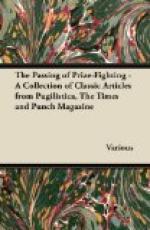Three old ladies in Trim decided to get up a Tombola for the poor this winter, and of course they sent Murphy a sheaf of tickets. As lotteries are illegal they, being pious, hated them; anyway they decided to call it a Tombola. They got the whole of Ireland to send them prizes, articles of vertu and bric-a-brac, and any other old things that are of no use to anybody, The carriage on the stuff and the printer’s bill nearly ruined the charitable ladies, but, as they said, the Tombola would pay all the expenses, and if they could knock any more out of it the poor should have it.
If you sold a dozen tickets you could keep the thirteenth for yourself, and as Murphy, on account of his charity, was so popular he must have sold hundreds. People seemed to have an idea that the raffle was for a gondola, and they thought it would look beautiful on the pond in front of the Town Hall. Unfortunately our local poetess confirmed this error by writing a poem about it called “Italy in Ireland,” which was produced in The Ballybun Binnacle, with a misprint about the gondolier’s “untanned sole,” which caused a fracas in the editorial office.
Murphy explained to all concerned that perhaps his Italian was rusty, and anyway his time was so taken up reading lottery-tickets and other charitable literature that he never knew what it was all for. It was a Tombola, however, this time, and not a gondola, they were subscribing for. It was a kind of Italian lottery which the police didn’t mind because the prizes were not in money or anything of value, but just Old Masters and brick-bracks. Murphy has such a way with him that the editor and the poetess each took a dozen tickets.
When the result of the draw was published Murphy won six prizes, but no one grudged him them as he had taken so much trouble. The Grand Prize, a “statue carved by an Italian artist, the finest bit of sculpture ever seen in Ireland,” was won by our popular grocer, Mr. McAroon. We were all delighted. People trooped in crowds to McAroon’s back-door after closing-time to toll him so. The police took their names, but the magistrates, who have a great respect for the fine arts, said that this was a day in the artistic development of the Cinderella of the West which automatically and prima facie regularised an extension of closing-hours.
McAroon said that his religion did not run much to statues, but that, to show his tolerance to all denominations, especially to those on his books, he would have it unveiled by his Minister. He would invite the Bishop and all men of goodwill to be present at the ceremony. He would place it in the corner of his garden overlooking the esplanade, where it would cheer the simple mariners coming home after their arduous fishing toils, and perhaps remind one or two of them (but he would mention no names) of a dozen or so of porter that had been left unpaid for after a recent wedding.




